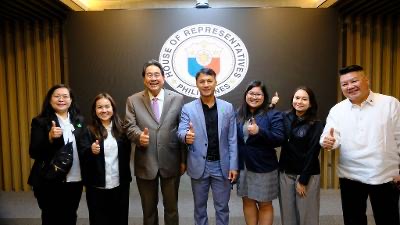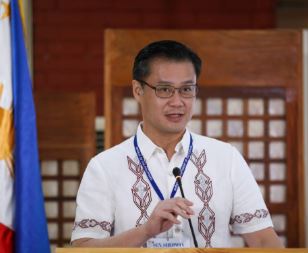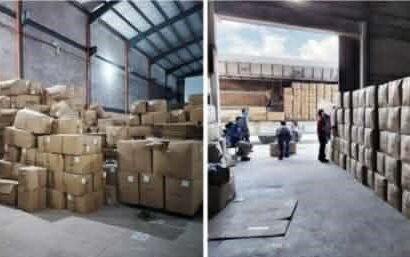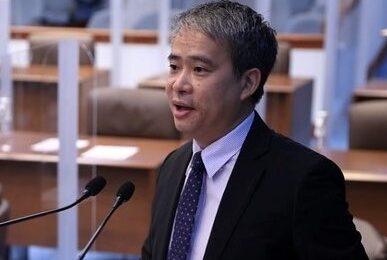CLARK FREEPORT ZONE (CIAC-PAD, August 22, 2024)—Lawmakers on Tuesday approved a measure that will create the national food hub at the Clark civil aviation complex aimed to centralize and modernize the distribution, storage, and processing of agricultural products in the country.

House Bill 10678 or ‘An Act Establishing the Clark National Food Hub, Appropriating Funds Therefor and for Other Purposes’ was unanimously approved by the House Committee on Trade and Industry chaired by Rep. Ferjenel Biron (4th District, Iloilo).
The bill’s principal authors are representatives Rufus Rodriguez (2nd District, Cagayan de Oro), Maria Angela Garcia (3rd District, Bataan), and Anna Victoria Veloso-Tuazon (3rd District, Leyte), while its co-authors are Rep. Salvador Pleyto (6th District, Bulacan) and Rep. Mark Go (Lone District, Baguio City).
Rodriguez said there is an urgent need to address the country’s food security issues through a systematic streamlining of food distribution process.
“Establishing a national food hub in Clark will play a crucial role in shortening the supply chain from producer to consumer (and) will not only standardized logistics but also ensure the efficient movement of food products, thereby enhancing overall efficiency. The initiative is further reinforced by the Philippines’ development plan which includes food security measures (and so) the Clark national food hub is designed to achieve these objectives for the Filipino people,” Rodriguez said.
The CIAC is tasked to develop, operate and manage the civil aviation complex surrounding the Clark International Airports and the site where the 62-hectare national food hub will be established.
CIAC President and CEO Arrey Perez said the committee approval is “a patriotic act that will benefit the country’s agriculture sector and the nation.”
“We’re both grateful and honored to be recognized as this support from Congress aligns with the national government’s initiative to develop the Luzon Economic Corridor which will position our country as a regional hub for agribusiness and logistics in Asia Pacific, and is consistent with the Marcos administration’s thrusts on agriculture development, particularly in the advancement of the country’s aqua-cultural and agricultural industries,” he added.
Early this year, President Ferdinand Marcos, Jr., U.S. President Joe Biden, and Japanese Prime Minister Fumio Kishida launched a steering committee to drive infrastructure development in the country’s Luzon Economic Corridor (LEC), supporting connectivity between Subic Bay, Clark, Manila, and Batangas.
Secretary Frederick Go, Special Assistant to the President for Investment and Economic Affairs who chairs the LEC committee, has identified food and agriculture as one of the priority industries for investments.
“We continue to pursue initiatives that contribute to increasing agriculture production, and improving the food logistical chain. The Clark National Food Hub is a step in this direction, and we look forward to its successful establishment as a sustainable food security solution,” Go said.
“As soon as this proposal becomes a law, it will bolster agrologistics as support to our country’s robust agricultural production. It will also enhance freight transport services, mobility, and access to key economic zones, toward seamless logistics and efficient supply chains. This means higher farm productivity and sustained agribusiness, and higher income for Filipino farmers,” Perez added.
Also in attendance during the committee hearing was former President and now Pampanga’s 2nd District Representative Gloria Macapagal-Arroyo who expressed support for this proposed flagship project, citing the CIAC leadership’s competence in promoting investments.
Perez noted the project will simultaneously address food security and logistics cost concerns by providing predictable, sustainable, and modern solutions for the demand and distribution of agricultural produce of Luzon to both domestic and foreign markets.
The approved measure will be referred to the Committee on Appropriations and the Committee on Ways and Means for the funding and tax incentives provisions.
The Clark National Food Hub features key components, including state-of-the-art food storage warehouses, cold storage- facilities, processing units, administrative offices, logistics infrastructure, and wholesale and retail market spaces.
The project will serve as a central hub for high-quality food products, catering to organized producers, collectors, retailers, supermarkets, suppliers, and regional producers. It offers an adapted consumption wholesale market to meet long-term fresh food requirements, facilitates the export of Filipino agricultural products, and includes an ambitious warehouse program for various food companies.





